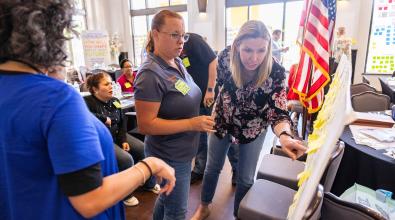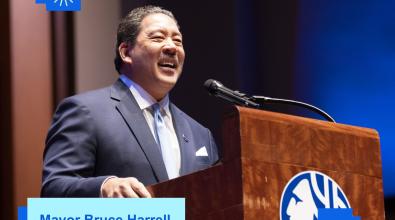 Read More
Read More
The mayors using their personal stories to power local breakthroughs

Photos courtesy of cities of Iowa City, Boise, and Providence/Photo by Austin McAfee/Icon Sportswire via AP Images
Listen to This Article
One of the best ways for mayors to achieve ambitious goals is by forging stronger connections with the people they serve. And one of the best ways they can do that is by learning how to effectively share more about themselves, their values, and why they care so much about the challenges faced by their communities. That’s why a key offering of the Government Innovation programs at Bloomberg Philanthropies, which aim to strengthen city halls so local leaders can implement bold solutions that move us all forward, zeroes in on the power of public narrative skills.
Bloomberg Center for Cities at Harvard University faculty affiliate Marshall Ganz has equipped hundreds of global mayors with this skill set as part of the Bloomberg Harvard City Leadership Initiative. His training encourages leaders to explore the origins of their values and their motivations for addressing public challenges. By reflecting on their personal struggles and moments of hope, leaders can craft compelling narratives known as a “story of self,” a “story of us,” and a “story of now.” This enables them to effectively communicate their values and experiences, connect with residents, and mobilize collective action to tackle shared challenges. (Mayors and other local leaders who wish to dig deeper into this framework can do so here.)
Below, four mayors who've undertaken this training discuss how public narrative skills have helped them deliver on local priorities and urgent challenges.
These insights have been edited and condensed for clarity.
Providence, R.I., Mayor Brett Smiley has talked in depth to residents, local partners, and media outlets about his own history of substance misuse to help advance a comprehensive overdose prevention strategy. As part of his larger efforts on this issue, he has also helped build support for the first overdose prevention center in his state.
Mayor Brett Smiley: “As a voter and engaged citizen, I've always been predisposed to want to hear what policymakers plan on doing, and less so about who they are. It has been helpful to realize that, in order to motivate partners and constituents to take action, that there needs to be an emotional connection, as well. And the best way to make that emotional connection is through narrative storytelling, and personal moments of connection.
“For this relationship-building piece, it is important for people to understand that even though our lives might look very different, we have had similar struggles, and we speak the same language. That has helped tremendously with building relationships with advocates and people in recovery.
“Right when I was taking office, we had a draft opioid overdose prevention strategy coming out. And as a person in recovery I was able to reflect upon my own experience to both look at the strategy through that lens, and also better identify some of the missing pieces. I brought some credibility to the conversation, really challenging experts and other professionals who've been working on this for a while. I'm not an expert in everyone's experience, but I'm an expert in my own experience, and it gave me credibility to make the case for why I care. And I do think that it caused some of our partners to listen differently or to think differently about the feedback that I was providing.
“For example, we now have emergency medical services—people who would be on an ambulance—on bikes servicing people with mental-health needs and substance-use needs in hotspots in the city, which is a new initiative in my tenure. There's a whole ripple effect of stigma and chaos that happens when three fire trucks and an ambulance arrive. So in a much less chaotic, much less stigmatizing manner, we have EMS professionals on bicycles—no lights and sirens—better meeting the needs of an individual in crisis, no different than they would if an elderly person tripped or fell. That has been a really strong initiative that we are now expanding.”
Iowa City, Iowa, Mayor Bruce Teague has been leading his city, including local students, to support LGBTQ rights in a sometimes hostile state political climate. He also helped launch the first LGBTQ Chamber of Commerce in Iowa. His city was awarded a perfect score for inclusive policies in Human Rights Campaign’s 2023 municipal equality index.
Mayor Bruce Teague: “The Bloomberg Harvard City Leadership Initiative taught me to tell my personal story—to talk about my values, and also explain the sense of urgency that my intended audience needs to hear, and then ask them to act in response to that.
“One thing we learned was to be really descriptive. If you say that you cried, paint that picture. Were tears streaming down your face? Did they stop at your cheek or change the color of your blue shirt? That kind of detail really can draw people in and help them see you as a human.
“For our LGBTQ-plus youth, specifically, in our community, I've learned that the urgent message is to care for one another. And I go back to my old stories of myself coming up as a youth, and I often tell them how jealous I am that they get to have these conversations, among their peers and their school, and that they have support groups. Not to minimize their experience, but sharing my upbringing has really opened them to the fact of: Wow, our mayor—he really is gay. And he understands what we're going through.
“I often talk about how, at the age of 16, I came out to my pastor and my parents, and how immediately we went into prayer and that, for a year, I was ‘praying the gay away.’ When I share different aspects of that with individuals, their eyes open wide and they shake their heads, because so many have that experience.
“Becoming a part of the Chamber of Commerce and elevating that not only here locally, but across our state, has really inspired other communities to consider becoming a part of that journey. It gives the LGBTQ-plus community hope: something positive that is business-related. But it also builds up that sense of community and provides a space for people to come to grow into and collaborate and has been such a great beacon of light for so many people. We're just in the infancy stages, but it's been well received, and the celebrations have been well-attended by people near and far—just to have a space for happiness.
“We always leave a message of hope, at the end. Because I think ultimately, that's what people really need. And you never end a conversation with a constituent who is asking for something without a call to action.”
Former Atlanta Mayor Keisha Lance Bottoms, who more recently served as a senior advisor to the White House for public engagement, deployed her public narrative training during a moment of acute crisis in her city. Amid concerns that Black Lives Matter protests might become destructive, the mayor spoke about herself, her city, and the importance of calm, likely helping to reduce unrest.
Former Mayor Keisha Lance Bottoms: “For me, professionally, the training was life-changing. In May 2020, in the aftermath of the George Floyd murder, I did a press conference that millions of people saw. At that moment, we were seeing racial divides. We were seeing generational divides. It was ‘us versus them.’ And I could even feel that happening in my own household, because my oldest son was 18 years old at the time. And he was actually in the room with me when I gave the press conference—it was pretty amazing that I was able to get him to go with me down to police headquarters to deliver it. So I was speaking as much to him as to anyone, to let him know that I heard him, and I understood, and I was processing his pain as a mother would have, but also processing as a leader. It was as much about connecting with my own children as it was about connecting with the community.
“What was interesting about that press conference is that I had gotten in the habit of structuring my public comments in the way that we were taught during our training. When I went back and watched it, I delivered it just the way that we were taught to deliver. There was a very short, succinct delivery of the story of me, story of us, and where do we go from here? It wasn’t intentional—I didn't even write those remarks down. But because I had gotten into the routine of thinking in that structure, I was able to deliver it in a way that resonated with people around the globe.”
Boise, Idaho, Mayor Lauren McLean has leaned on her personal story as someone who struggled with housing costs—and worries about her daughter’s future—to help pass historic zoning reforms in her city. Those reforms have been quickly followed by a surge in applications to build accessory dwelling units—often small backyard homes or converted garages—that can be more affordable for residents.
Mayor Lauren McLean: “Before I became mayor, I was always involved in organizing groups. And without knowing it, I was already using narrative in some way to inspire a group of people to act together to get X, Y, or Z done. But what I hadn't thought about and didn't feel comfortable doing until I went through the training was weaving my personal stories into those efforts.
“I decided to share my and my husband's story when we faced significant pushback proposing a modern zoning code in Boise that focused on rentals instead of homeownership.
“I met my husband in high school, and we married right out of college. Within a year, without any family help, we managed to scrape together enough savings for a tiny down payment and bought a house before our first child was born. Now my daughter is the same age I was when we bought that house, but there's no way she could do what we did.
“I told this personal story many times at the door and in larger spaces. I explained that to save for a house, I needed to rent an affordable place first. This allowed me to save money. As a result, the tone, tenor, and reaction to the proposed zoning code changed significantly. Our council unanimously passed the reforms, which is rare. I believe this success was due not only to my storytelling but also to others who shared their stories, demonstrating why the council should vote for these changes.
“This collective storytelling was incredibly effective in transforming the community conversation. It made the potential changes more specific, personal, and reflective of who we are as a city.”

